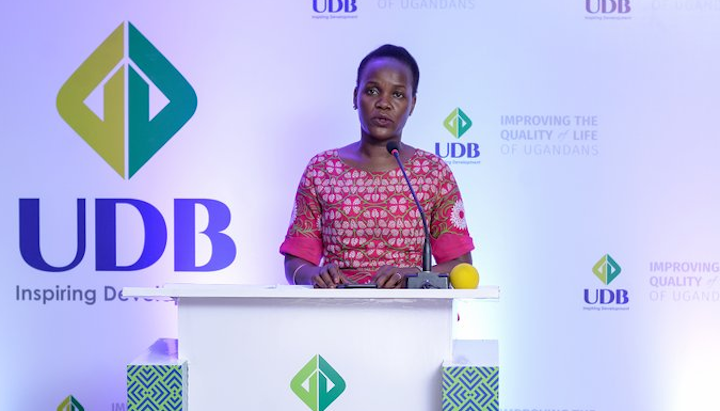Uganda Development Bank (UDB) has retained its position as the highest-rated credit-worthy institution in the country, according to global market research and rating firm, Fitch Rating.
The country’s national development finance Institution retained a National Long-term Rating of ‘AAA (uga)’ with a Stable Outlook, the highest attainable on Uganda’s national scale, which also reflects high support propensity by the government.
A credit rating is an assessment of the creditworthiness of a borrower in general terms or concerning a particular debt or financial obligation. It can be assigned to any entity, individual, or sovereign government that seeks to borrow money.
Fitch Ratings has also affirmed UDB’s Long-Term Issuer Default Rating (IDR) at ‘B+’ with a Negative Outlook and UDB’s Government Support Rating (GSR) at ‘B+’.
The IDR is given by the rating firm to a financial institution based on international lenders’ opinion of its ability to pay.
The Government Support Rating is equalized with Uganda’s sovereign rating, reflecting Fitch’s view of the authorities’ high propensity to provide support.
“The Negative Outlook on UDB’s Long-Term IDR mirrors that on Uganda’s sovereign rating,” the Fitch Rating report reads in part. Uganda has a “Negative Outlook” due to its weak external cash position and limitations to access to external concessional financing and grants, over concerns on democracy, human rights, and corruption.
This is in addition to high government interest payments and rising external debt service which all affect financing and liquidity pressures.
“As is usual for policy banks, Fitch does not assign a Viability Rating to UDB. This is because its operations are largely determined by its policy role,” Fitch Rating bases their decision on key factors like the government’s high likelihood l to support UDB, given the bank’s important policy role, whole state ownership, as well as a significant share of state-guaranteed funding. It also noted the government’s strong record of capital injections.
UDB is Uganda’s primary development bank, lending on preferential terms to borrowers in strategically important sectors of the economy, in particular agriculture. UDB is predominantly funded by equity due to consistent government capital injections, in addition to fairly low-priced borrowings that are mostly government-guaranteed.
UDB is well-capitalized, as indicated by a tangible leverage ratio of 81 percent as of the end of 2022, with government capital contributions, totaling 829 billion shillings between 2019-2022.
Fitch expects government capital contributions to continue. Another supportive factor is state funding guarantees, as UDB’s non-equity funding comprises borrowings from development finance institutions and was almost entirely government-guaranteed as at end-2022.
Fitch notes that UDB’s liquid assets “comfortably cover upcoming debt repayments.”
The lender also has a high-risk appetite. It lends to higher-risk customers that are under-served by domestic commercial banks. It has high concentrations, with customers in the agriculture and agro-processing sectors representing 44 percent of gross loans as of the end of 2022, while the loan book is growing by 54 percent.
The strong loan growth creates asset-quality seasoning risks. High profitability is another strong point for the Bank UDB, with annual operating returns on assets averaging 4.5 percent, driven by a wide net interest margin that benefits from a low cost of funding. According to Patricia Ojangole, the UDB Managing Director, the Fitch Rating reflects the Bank’s strong funding and liquidity profile, healthy capitalization, and sound asset quality.
“This is an affirmation of the Bank’s strategic importance towards the socio-economic development of Uganda and confers investor confidence in the Bank. UDB recognizes the efforts of the Government, the Ministry of Finance, among other stakeholders who have been instrumental towards the Bank’s growth and the support that has been rendered over time,” she said.
On the encouragement, social, and governance issues, UDB has an “ESG Relevance Score of ‘4[+]’ for Human Rights, Community Relations, Access & Affordability due to its policy role, which promotes financing to under-banked and under-served sectors of the Ugandan economy.
.“At UDB, we have exposure to services for underbanked and underserved communities: SME and community development programs; financial literacy programs among others which, in combination with other factors, positively impact our ESG rating.
According to Fitch Ratings, unless otherwise disclosed in this section, the highest level of ESG credit relevance is a score of ‘3’. A score of ‘3’ means ESG issues are credit-neutral or have only a minimal credit impact on the entity, either due to their nature or how they are being managed by the entity.
“UDB’s scores are similar to the majority of the bank’s Fitch rates globally, with the one exception being a ‘4’ for “Human rights, community relations, access, and Affordability”.
The rating committee decided that this factor has a positive impact on the credit rating, namely the Long-Term Issuer Default Rating, which is in turn driven by the Government Support Rating.
The committee’s view was that UDB’s policy role, which includes servicing the underbanked population in Uganda, positively affects the government’s propensity to provide support to the bank, which in turn has a positive influence on the Long-Term IDR.
For comparison, a purely commercial bank would likely have this factor scored ‘2’,” the report by Fitch Ratings further reads. A credit rating can be assigned to any entity that seeks to borrow money — an individual, corporation, state or provincial authority, or sovereign government.
















